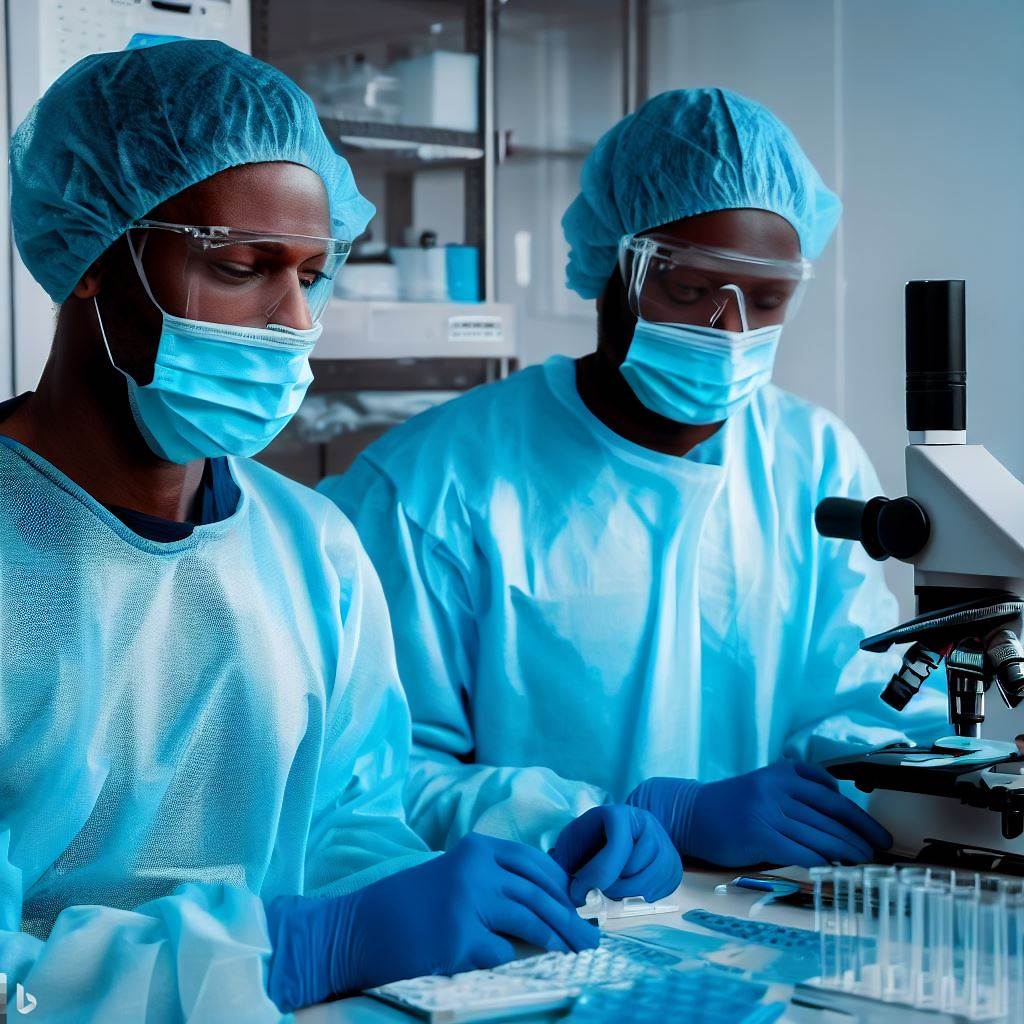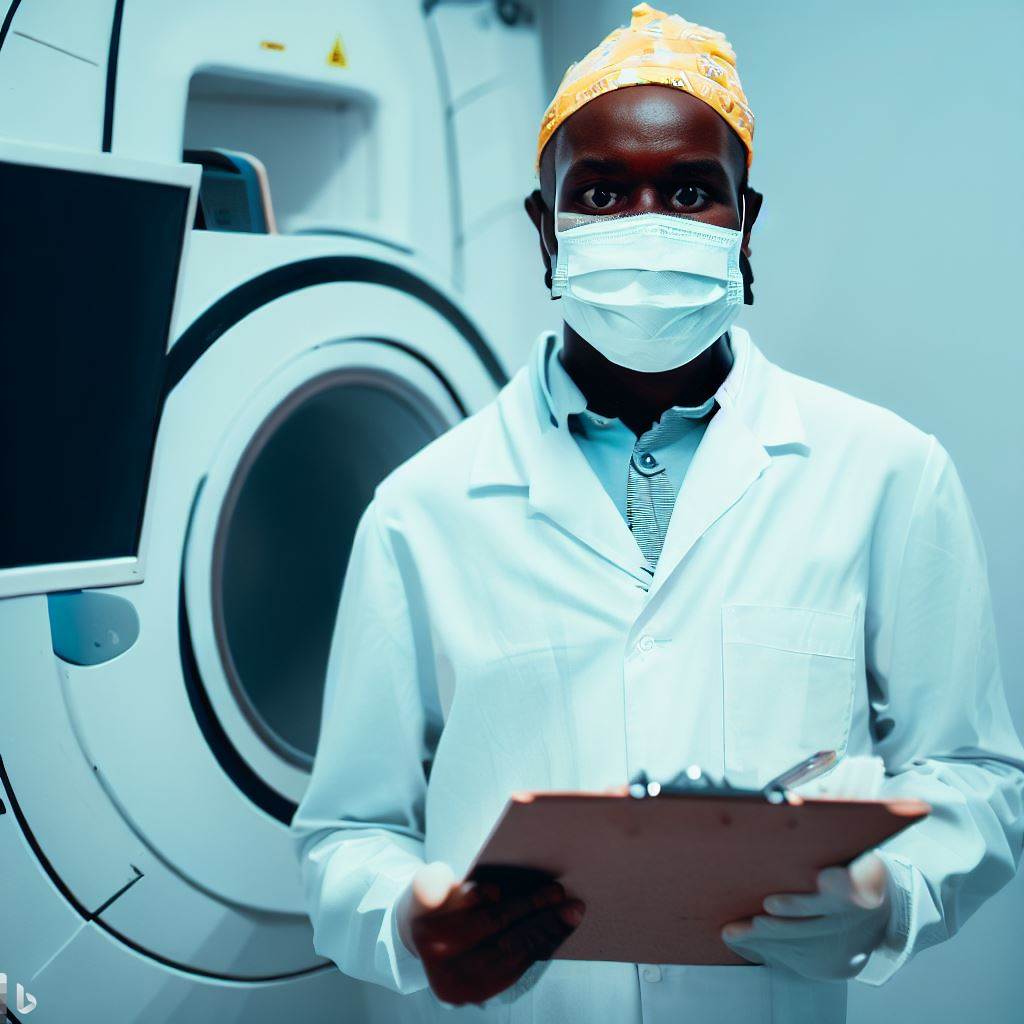Introduction
Infectious disease control is crucial in Nigeria and lab technicians play a vital role in this process.
Lab technicians are responsible for conducting tests and analyzing samples to identify infectious diseases.
Their work is crucial in detecting and diagnosing diseases such as malaria, tuberculosis, HIV/AIDS, and Ebola.
Lab technicians are trained to handle and analyze samples safely, minimizing the risk of further transmission.
They ensure that accurate and timely results are obtained, aiding in the early detection and treatment of infectious diseases.
Their work also includes monitoring disease outbreaks and implementing control measures.
Lab technicians collaborate with healthcare professionals and public health officials in developing strategies to prevent and control the spread of infectious diseases.
They play a key role in surveillance and monitoring the effectiveness of control measures.
Lab technicians also contribute to research and development, improving diagnostic techniques and treatment options.
Their work is essential in reducing morbidity and mortality rates associated with infectious diseases in Nigeria.
Basically, lab technicians play a critical role in infectious disease control in Nigeria.
Their expertise in conducting tests, analyzing samples, and implementing control measures is instrumental in preventing the spread of diseases and saving lives.
Duties and Responsibilities of Lab Technicians in Infectious Disease Control
Lab technicians play a crucial role in infectious disease control in Nigeria. Their duties and responsibilities include:
- Conducting laboratory tests to identify infectious diseases: Lab technicians are responsible for performing various tests to diagnose the presence of infectious diseases. They follow specific procedures and protocols to ensure accurate and reliable results.
- Performing analysis and interpreting lab results: Once the lab tests are conducted, lab technicians analyze the collected data and interpret the results. They need to possess excellent analytical skills and attention to detail to identify any abnormalities or indications of infectious diseases.
- Collecting and processing samples for testing: Lab technicians are responsible for collecting samples, such as blood, urine, or tissue, from patients suspected of having infectious diseases. They must follow proper procedures to ensure the samples are accurately collected and preserved.
- Ensuring proper maintenance and sterilization of lab equipment: Lab technicians are responsible for maintaining and sterilizing laboratory equipment to ensure accurate testing. They must follow established guidelines and protocols for cleaning and maintaining lab equipment.
Lab technicians are crucial in the fight against infectious diseases in Nigeria. Their expertise and dedication help identify and control the spread of these diseases, ultimately saving lives.
Read: Life of an Orthotist/Prosthetist in Nigeria Revealed
Training and Qualifications Required for Lab Technicians
Lab technicians play a crucial role in infectious disease control in Nigeria. To effectively contribute to this field, they must possess the necessary training and qualifications.
Here are the educational requirements, certifications, and continuous education importance for lab technicians:
Educational Requirements and Degrees Needed
Lab technicians in Nigeria typically need a minimum of a bachelor’s degree in medical laboratory science or a related field.
These degrees provide them with a solid foundation in the scientific principles and techniques required for their work.
Coursework often includes subjects like microbiology, biochemistry, immunology, and medical ethics.
Lab technicians may also opt to pursue higher degrees, such as master’s or doctoral programs, to specialize further in infectious disease control.
Certification and Licensure Prerequisites
Once the educational requirements are fulfilled, lab technicians must obtain relevant certifications and licenses.
The Medical Laboratory Science Council of Nigeria (MLSCN) is responsible for certification in the country.
Applicants are required to pass the MLSCN licensing examination to demonstrate their competence and knowledge in the field.
Licensure ensures that lab technicians adhere to professional standards and ethics.
Obtaining certifications and licenses also enhances their credibility and employability.
Importance of Continuous Education and Training
The field of infectious disease control is ever-evolving, with new advancements and techniques emerging regularly.
Lab technicians must prioritize continuous education and training to stay up to date with the latest developments. Here are the reasons why:
- Advancements in diagnostic tools and technology: Continuous education allows lab technicians to learn about and adopt new diagnostic tools and technologies.
- Improved laboratory techniques: Ongoing training enables lab technicians to refine their laboratory techniques, leading to more accurate and reliable results.
- Emerging infectious diseases: Continuous education helps lab technicians stay informed about emerging infectious diseases and develop appropriate testing methods.
- Quality assurance: Regular training ensures that lab technicians maintain high standards of quality control and assurance in their work.
- Continuing professional development: Continuous education contributes to the personal and professional growth of lab technicians, enhancing their career prospects.
- Collaboration opportunities: Attending training programs and workshops allows lab technicians to network and collaborate with experts in the field.
- Patient safety and public health: Well-trained lab technicians play a vital role in safeguarding patient safety and protecting public health from infectious diseases.
In essence, lab technicians in Nigeria should meet specific educational requirements, obtain certifications and licenses, and engage in continuous education and training.
By doing so, they can contribute effectively to infectious disease control, keeping up with advancements and ensuring quality laboratory practices.
Read: Education and Training for Nursing Assistants in Nigeria
Key Skills and Traits of Successful Lab Technicians
- Attention to detail and precision in conducting lab tests.
- Well-developed analytical and problem-solving skills.
- Excellent organizational and time management abilities.
- Strong communication skills for effective collaboration with healthcare professionals.
Read: Medical Lab Technician: Required Education in Nigeria
Laboratory Safety Measures and Infection Control
Laboratory safety measures and infection control play a crucial role in the daily operations of lab technicians in Nigeria.
These professionals are responsible for handling infectious agents and hazardous materials, making it essential to follow strict protocols to ensure the safety of themselves, their colleagues, and the environment.
Proper Handling and Disposal of Hazardous Materials
Lab technicians must have a thorough understanding of the correct handling and disposal of hazardous materials in the laboratory.
This includes proper labeling, storage, and transportation of these substances to prevent accidental exposures and contamination. They must also be equipped with the knowledge of appropriate personal protective equipment (PPE) to minimize risks.
Ensuring Adherence to Safety Protocols and Procedures
Adherence to safety protocols and procedures is paramount in preventing the spread of infectious diseases within the laboratory setting.
Lab technicians should strictly follow guidelines provided by regulatory bodies and organizations, such as the World Health Organization (WHO) and the Centers for Disease Control and Prevention (CDC).
Regular training and refresher courses should be conducted to keep the lab technicians up to date with the latest safety procedures. Supervisors and lab managers should enforce these protocols to maintain a safe working environment.
Importance of Maintaining a Clean and Controlled Environment
A clean and controlled environment is essential for preventing contamination and maintaining accurate test results.
Lab technicians must clean and sanitize work surfaces, equipment, and utensils regularly. They should also ensure proper waste management, including the segregation, labeling, and disposal of biohazardous waste.
Regular and proper decontamination of laboratory surfaces and equipment helps eliminate potential pathogens that might pose a risk to staff and study subjects.
It is necessary to create a culture of cleanliness and hygiene within the laboratory setting.
Read: The Path to Becoming a Surgeon in Nigeria
Preventive Measures to Minimize the Risk of Lab-acquired Infections
Lab-acquired infections can occur through incidents such as accidental spills, needle pricks, or inhaling aerosols. To minimize these risks, lab technicians must strictly adhere to preventive measures, such as:
- Wearing appropriate PPE, including gloves, goggles, and lab coats, to protect against direct contact and airborne transmission of infectious agents.
- Practicing proper hand hygiene by regularly washing hands with soap and water or using alcohol-based hand sanitizers.
- Implementing rigorous disinfection and sterilization procedures for equipment and instruments.
- Establishing proper ventilation systems to minimize the concentration of airborne pathogens.
- Creating an incident reporting system to ensure prompt action and investigation of accidents or potential exposures.
These preventive measures should be continuously reinforced through training sessions, reminders, and periodic safety inspections.
Lab technicians should be vigilant and proactive in identifying potential safety hazards and promptly reporting them to their supervisors.
Overall, laboratory safety measures and infection control are crucial aspects of the lab technician’s role in infectious disease control in Nigeria.
By following proper handling and disposal protocols, adhering to safety procedures, maintaining a clean environment, and implementing preventive measures, lab technicians can minimize the risk of lab-acquired infections and contribute to effective disease control efforts in the country.
Read: Pros and Cons of Being a Nursing Assistant in Nigeria

Challenges Faced by Lab Technicians in Infectious Disease Control in Nigeria
Lab technicians play a crucial role in infectious disease control in Nigeria, but they face several challenges that hinder their effectiveness in tackling these diseases.
Let’s discuss the key challenges faced by lab technicians in Nigeria and their impact on infectious disease control.
Inadequate resources and funding for laboratories:
Lab technicians often struggle with limited resources and funding, making it difficult to conduct proper testing and diagnostics for infectious diseases. Without adequate resources, accurate disease diagnosis and surveillance become challenging.
Limited access to advanced testing equipment and technology:
The lack of advanced testing equipment and technology further impedes the work of lab technicians. Many labs in Nigeria lack the necessary equipment to perform rapid and accurate testing, resulting in delayed diagnoses and inefficient disease control.
Staff shortage and high workload:
Lab technicians in Nigeria often face staff shortages and high workloads, which can lead to fatigue and errors in testing. The high demand for infectious disease testing, combined with limited staffing, puts significant pressure on lab technicians and compromises the quality of their work.
Lack of public awareness about the importance of lab technicians:
There is a lack of public awareness about the essential role lab technicians play in infectious disease control. Many people underestimate the significance of accurate diagnosis and testing, leading to a lack of support and recognition for lab technicians.
The challenges in Nigeria’s infectious disease control have significant implications. Inadequate funding and resources for laboratories hamper timely and accurate disease detection.
Overburdened lab technicians face misdiagnosis and delayed treatment, increasing disease transmission. Public awareness about their importance is lacking, hindering resource advocacy.
Solutions include increased funding, advanced equipment procurement, more lab technicians recruitment, and public education campaigns to support their vital role in disease control, essential for effective infectious disease management in Nigeria.
Read: Occupational Therapy Schools: Where to Study in Nigeria
You Might Also Like: An Introduction to Clinical Laboratory Tech Work in Nigeria
Collaboration between Lab Technicians and Healthcare Professionals
- Importance of a multidisciplinary approach in infectious disease control.
- Effective communication and coordination between lab technicians and healthcare professionals.
- Sharing of information and findings to develop appropriate treatment plans.
Success Stories of Lab Technicians in Infectious Disease Control
In Nigeria, lab technicians have played a crucial role in controlling infectious diseases.
- Ebola Outbreak: During the Ebola outbreak in Nigeria in 2014, lab technicians quickly identified and confirmed cases, allowing for timely isolation and treatment.
- HIV Testing and Counselling: Lab technicians have been at the forefront of HIV testing and counselling, ensuring early detection and access to treatment for patients.
- Malaria Control: Through accurate diagnosis and monitoring, lab technicians have contributed significantly to the control and prevention of malaria in Nigeria.
- Tuberculosis Testing: Lab technicians have played a vital role in diagnosing and monitoring tuberculosis cases, facilitating prompt treatment and preventing its spread.
- Polio Eradication: Lab technicians have been involved in the surveillance and testing of polio cases, contributing to the ongoing efforts to eradicate the disease in Nigeria.
- Outbreak Investigations: Lab technicians are essential in investigating disease outbreaks, identifying the causative agents, and implementing control measures to contain the spread effectively.
- Vaccine Development: Lab technicians have collaborated with researchers to develop vaccines for infectious diseases like measles, yellow fever, and meningitis, thereby saving countless lives.
- Quality Assurance: Lab technicians ensure the accuracy and reliability of diagnostic tests, maintaining high standards in infectious disease control.
- Surveillance Systems: Lab technicians contribute to the establishment and maintenance of robust disease surveillance systems, allowing for early detection and response to potential outbreaks.
- Training and Capacity Building: Lab technicians participate in training programs to enhance their skills and knowledge, ultimately strengthening the infectious disease control infrastructure in Nigeria.
The impact of their work on healthcare outcomes
These success stories demonstrate the critical role lab technicians play in infectious disease control in Nigeria.
Lab technicians are unsung heroes, working behind the scenes to safeguard the health of the population.
As unsung heroes, supporting their development is vital for a robust infectious disease control system in Nigeria.
Read: How to Become a Diagnostic Medical Sonographer in Nigeria
Conclusion
Lab technicians play a crucial role in the control of infectious diseases in Nigeria. Their responsibilities include conducting diagnostic tests, analyzing samples, and interpreting results.
Lab technicians also possess essential skills such as attention to detail, adherence to safety protocols, and proficiency in laboratory techniques.
It is important to recognize the tireless efforts of lab technicians and provide them with increased support.
We must emphasize the significance of ongoing efforts to strengthen infectious disease control measures in Nigeria.
Empower lab techs with resources and recognition for effective disease detection, monitoring, and containment.
Advocate for investing in lab infrastructure, training, and career development in Nigeria.
Together, we ensure skilled lab technicians boost infectious disease control in our country.




